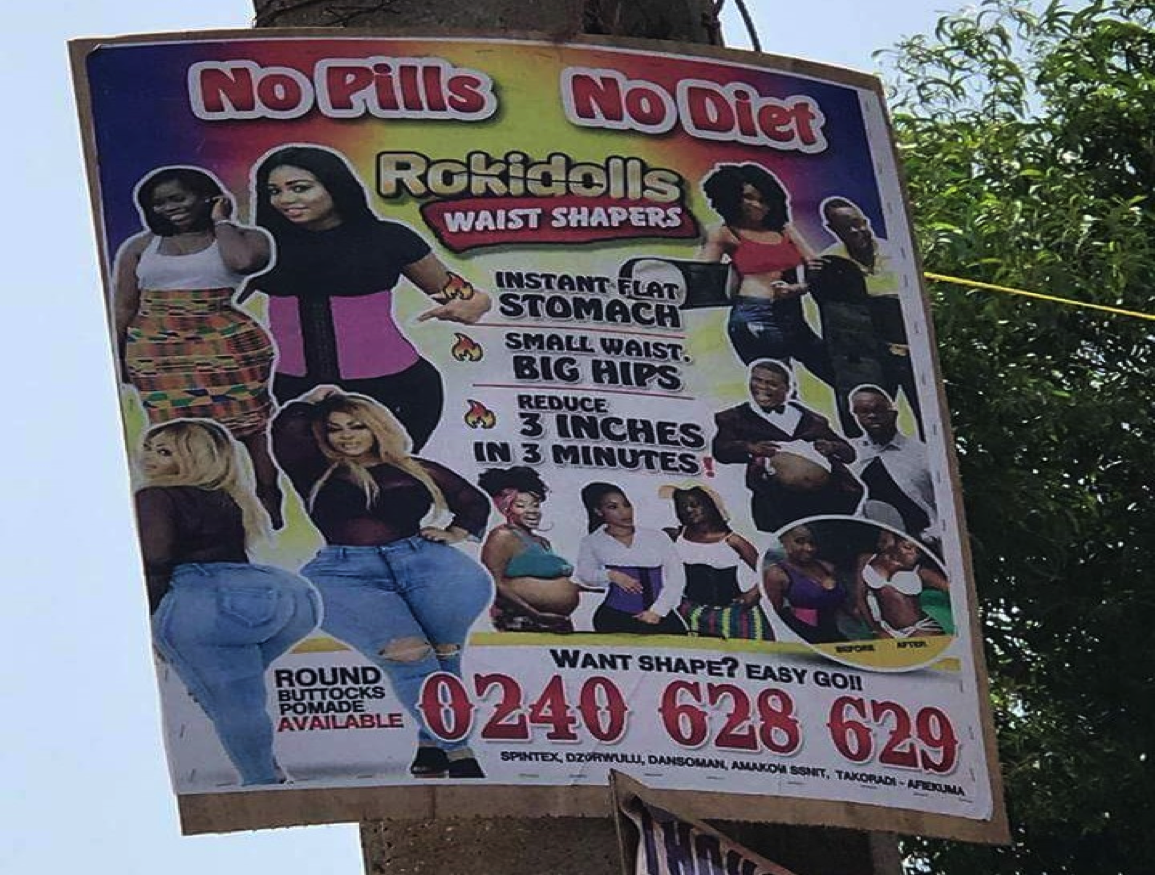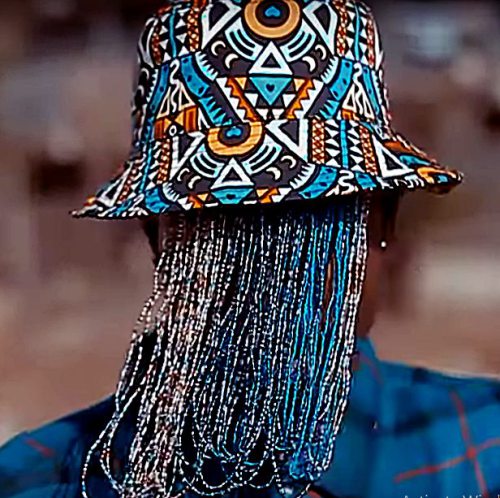Photo Credit: Anny Kareem-Abdi Osabutey (Facebook Page, 2018)
ROUND BUTTOCKS POMADE AVAILABLEINSTANT FLAT STOMACHSMALL WAIST, BIG HIPSREDUCE 3 INCHES IN 3 MINUTES… Beauty ideals are not set in stone; they are fluid, constantly changing and usually influenced by sociocultural contexts. Globalization, and the associated dominance of Western consumer culture are increasingly ensuring the exportation of the thin and slender body ideal to the Global South. A casual stroll in the streets of Accra, Ghana reveals an inundation with billboards and posters promising images of the sculptured body. “Come all, ye seekers of flat stomachs, small waists, big hips and weight loss regimes without any side effects.” On various social media sites, the narrative is no different. Many individuals and businesses are having a field day on the entrepreneurial side of this development, as if it is the new ‘oil’, as they advertise weight loss pills, waist trainers, and waist shapers. Many studies have attributed the growing infatuation with the thin and slender body to media imagery and frames. Popular media in their objectification of women tend to present the ideal woman’s body as slim. Thus these studies argue that women internalize the imagery they see in media spaces and subsequently self-objectify to fit in with these ideals. A few studies also point to the fact that men are objectified in media spaces, but not anywhere close to the objectification of women. In Ghana, traditionally, plumpness has been valorized among most peoples; however, there seems to be a shift towards slenderness in recent times. Quite a number of Ghanaian Facebook groups are for example aimed at fitness and weight loss. Although, ‘keep fit’ sessions – walks and workouts – sometimes led by public figures, are nothing new in Accra, the weight loss and waist training ‘revolutions’ could be described as recent. Various studies have pointed to changes in nutrition patterns as well as modern sedentary lifestyles leading to increasing obesity. Thus more women are becoming obese and they are increasingly indulging these waist trainers because they want a fast way of losing the fatty middle. (Notwithstanding this, many of the women who resort to these ‘remedies’ are really not obese. They have healthy body weights but just want to fit certain societal conception of beauty.) While it may seem that ‘modernization’— more like, westernization—is changing how Ghanaian women are constructing their bodies, local culture mediates this interaction. The aim for most Ghanaian women is not to have the ‘waif-like’ slender and ‘thin Twiggy’ or ‘Kate Moss’ look. While leaning towards slimness, Ghanaian women typically want to keep their curves hence the popularity of the waist trainer and waist shaper. In fact, I was personally surprised to have been told; “you’ve gained weight oo” when I posted pictures of my 65kg self on Facebook. I have also seen pictures of friends who are probably on the threshold of being underweight but have declared themselves as having gained too much weight on their Facebook pages. Yet again, I know friends who have thought themselves too slim and taken some food supplements to gain weight. So while there is definitely some more mainstream emphasis on slimness, it is important to point out that there is not an overarching ideal that most women aspire for as in the case of the thin and slender ideal in the West. A random listen to popular Ghanaian music will for example, show such an appreciation of a variety of body types – “slim things”, “atea donko”, “chingilingi,” “bola bola” and women with “world trade centre assets”. It must however not be forgotten that often it is men singing these songs. This supposed variety could thus be seen as a celebration of different female body types or just a reflection of the ‘liberal’ tastes of these men. In a consumer culture where the presentation of one’s self has become extremely important, the body is a central resource for constructing one’s identity. Body shape seems to be the popular target area for quite a number of urban Ghanaian women attempting to fashion their body image. This is also because more sedentary lifestyles in the city has led to increasing weight sizes as opposed to more rural settings were life is more robust. This is also because in a neoliberal society, how one looks has become increasingly important for some job specifications such as in most service sectors. Women most often have to to enhance their physical capital in various job positions such as being a bank teller or flight attendant. Socio-economic status in particular also plays an important role in the use of body enhancement products. Various studies indicate that economic capital is a significant factor which determines the use of these products. Many women have pointed to the fact that they will have cosmetic procedures for their ideal body shapes and sizes only if they had the financial wherewithal. This points to why waist trainers are becoming such a popular alternative. Whiles liposuction or surgery requires thousands of cedis, waist trainers offer a fast though temporary alternative to shaping one’s body at minimal costs. It also does not conflict with the Ghanaians religious perception of not altering one’s God given body. What I wish to draw attention to is the danger of social media with its abundance of images and interacting factors that make it much easier for body dissatisfaction to become an issue. Body dissatisfaction in most Western societies has been associated with low self-esteem, bulimia, anorexia-nervosa, and unsustainable dieting schemes among others. Also, like in the 17th century, these waist trainers – which are just refashioned corsets – had many negative effects such as suppressing appetites, fertility challenges and even breathing difficulties. In a country where pharmaceutical regulations are weak, exploitative businesses take advantage of the situation to market all sorts of dubious food supplements for weight loss and body shaping as healthy choices. In this regard, the increasing popularity of body enhancement products on non-traditional marketing sites; electronic media and social media in Ghana must be really monitored by the Food and Drugs Board, Ghana Standards Board and National Media Commission. Media owners should be aware of the kind of images they populate their various mediums with. Images should represent diversity and empowerment among women. It should not lead to an inferior body complex which sets women on a risky pursuit of the sculptured body.
by Emelia Afi Agblevor
PhD Sociology Student at Hong Kong Baptist University. My current research is on “Construction of Body Shape Ideals among Urban Ghanaian Women”. I am a happy wanderer and love to see new places. Do check out my personal blog at afiiam.blogspot.com
You can also interact with me on
Twitter: @afiIam






2 thoughts on “Waist Shapers and the Fashioning of the Ghanaian Woman’s Body Ideal”